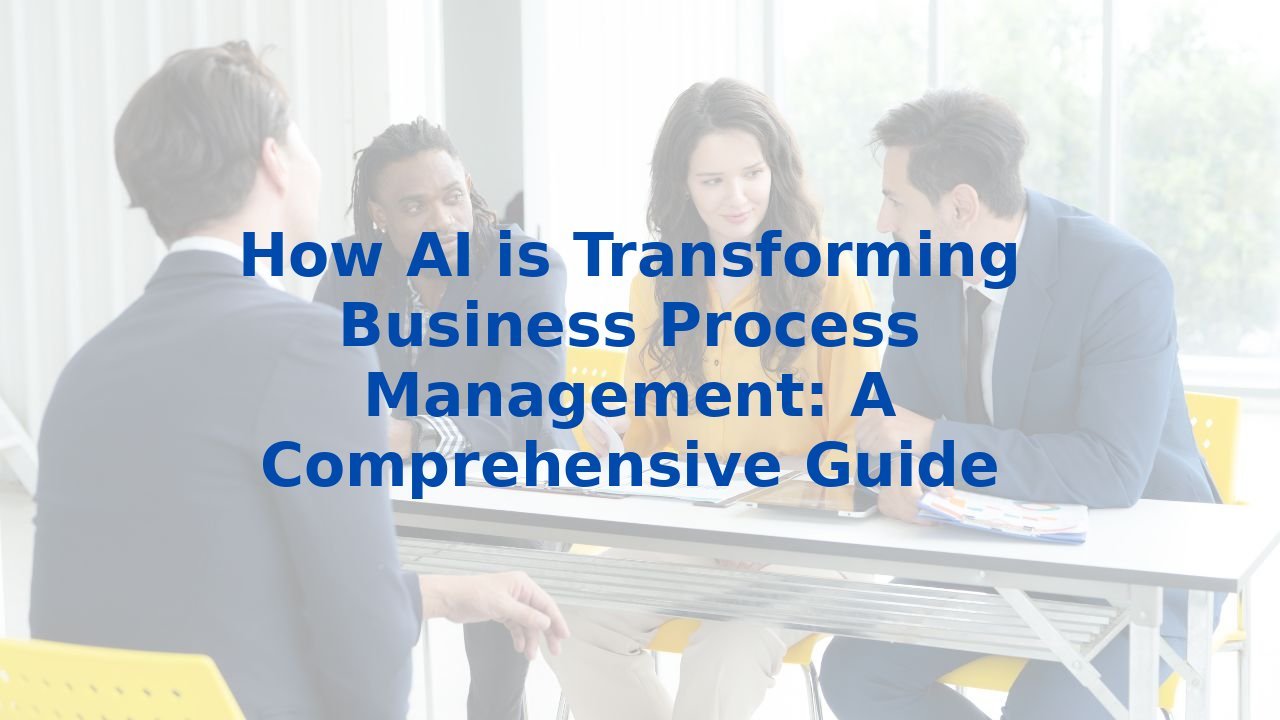How AI is Transforming Business Process Management: A Comprehensive Guide
How AI is Transforming Business Process Management: A Comprehensive Guide
In the rapidly evolving landscape of modern business, organizations are perpetually on the quest for tools and strategies that enhance their operations and hit peak efficiency. One of the most transformative innovations in this realm is the integration of Artificial Intelligence (AI) into Business Process Management (BPM). This guide will explore the ways AI enriches general business processes and the myriad benefits it brings, particularly regarding organizational efficiency.
Understanding Business Process Management
At its core, Business Process Management (BPM) is a critical discipline aimed at enhancing the performance and efficiency of business processes. It encompasses the comprehensive journey of analyzing, designing, executing, and monitoring operations to achieve organizational goals. Traditionally, BPM methods have relied heavily on manual analysis, which, while valuable, can be time-consuming and prone to human errors.
The Role of AI in BPM
AI is a game-changer in BPM, offering innovative tools and methodologies that analyze extensive datasets swiftly and accurately. Here are some primary ways AI elevates business processes:
Process Discovery
AI-driven process discovery acts as a spotlight, revealing hidden inefficiencies within an organization. By sifting through substantial operational data, AI can detect patterns and workflows often overlooked by human oversight. This crucial phase is integral for optimizing operational models, allowing businesses to pinpoint bottlenecks or redundancies that hinder performance.
Process Mapping
Following the discovery phase, AI process mapping transforms insights into actionable blueprints. With the power of machine learning and data analytics, AI can visually represent workflows, illustrating how processes intertwine and where inefficiencies reside. This ensures process documentation remains current, granting all stakeholders a unified understanding of the workflow.
Process Automation
Among the most impactful applications of AI in BPM is process automation. Robotic Process Automation (RPA) fueled by AI can seamlessly handle repetitive, rule-based tasks, liberating human resources for more strategic, value-generating activities. However, it is crucial to strike an equilibrium between automation and human involvement to maintain motivation and morale while preventing job displacement.
Process Management and Improvement
AI excels in continuously monitoring processes, leveraging historical data to alert management of potential issues. Through data-driven insights, predictive modeling, and dynamic adaptability, AI drives sustainable improvements. The continuous optimization of processes based on AI-derived feedback enables organizations to forge long-term success and innovation.
Benefits of AI in BPM
Integrating AI into BPM unlocks an array of benefits, including:
- Faster Results and Better Decision-Making: AI accelerates results and enhances decision-making by analyzing vast volumes of data with unparalleled speed and accuracy.
- Higher Quality and Efficiency: By automating repetitive tasks and optimizing workflows, AI improves the quality and efficiency of business processes while significantly reducing the possibility of errors.
- Real-Time Monitoring: AI-driven monitoring tools track key performance indicators (KPIs) in real-time, promptly alerting stakeholders to any deviations in expected outcomes. This facilitates timely interventions and corrections.
- Predictive Analytics: By leveraging historical data, AI can forecast potential disruptions or inefficiencies, empowering organizations to adapt proactively before issues escalate.
Training Employees for AI
While utilizing AI is pivotal for enhancing business processes, training employees to navigate these advanced technologies is equally essential. The benefits of employee training in AI are profound:
- Enhanced Collaboration: Equipping employees with AI knowledge fosters collaboration between human workers and AI systems, ensuring the effective utilization of their strengths for superior results.
- Improved Adaptability: A workforce trained in AI can transition more fluidly to evolving processes and technologies, maintaining organizational agility in a fast-paced environment.
- Better Decision-Making: An understanding of how AI operates and how to interpret its insights allows employees to make informed decisions that align with the organization’s objectives.
Conclusion
The integration of AI into Business Process Management is indeed revolutionizing operational dynamics across organizations. By leveraging AI for process discovery, mapping, automation, and ongoing improvement, businesses can streamline workflows, cut costs, and enhance overall performance. Furthermore, investing in training ensures that employees are equipped to embrace these technologies, fully unlocking the potential of AI. As the business world continues to evolve, the strategic deployment of AI in BPM will undoubtedly be a cornerstone of exponential growth and innovation.
To explore more about equipping your workforce with AI skills, consider exploring available training solutions.



